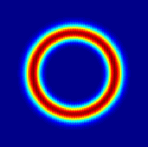 This is a collection of Matlab
files for computing time-frequency distributions or time-frequency
representations. (However, if you don't have Matlab, you can try
Octave
or SciLab.)
This is a collection of Matlab
files for computing time-frequency distributions or time-frequency
representations. (However, if you don't have Matlab, you can try
Octave
or SciLab.)
These programs are either a result of my research or something that I found useful enough to spend the time to implement. Included are a rigorous implementation of time-frequency distributions (Cohen class), some quartic time-frequency distributions, chirplet decomposition based on maximum likelihood estimation, fractional Fourier transform, time-varying filtering, and other useful utilities.
The image on the right is a spectrogram of a hermite function.
x = hermite(63,15);
s = spec2(x,1,64,1,2.2);
ptfd(s)
Screenshot
 The image on the right shows
example output from DiscreteTFDs. The main image is a spectrogram
of a whale whistle. Below the spectrogram is the envelope of the time
series and to the left of the spectrogram is spectrum in dBs. You can
listen to the whale whistle.
The image on the right shows
example output from DiscreteTFDs. The main image is a spectrogram
of a whale whistle. Below the spectrogram is the envelope of the time
series and to the left of the spectrogram is spectrum in dBs. You can
listen to the whale whistle.
For more examples, see the demonstration of chirplet decomposition of whale
whistles.
Download
New release of DiscreteTFD-v1.2 includes the recent development in parameterized time-frequency representation (PTFR). Thanks to Zhike Peng for providing the update. Three typical PTFRs have been added into the new version, i.e., polynomial chirplet transform, spline chirplet transform and generalized warblet transform. The parameter estimation examples associated to the respect PTFRs have been provided for the beginners who attempt to devote their efforts to this area.
Version 1.2 is available for download.
After 14 years, a new release of DiscreteTFDs!!! The only change is that the Chirplet code has been updated to work with the latest version of the Optimization Toolbox. Thanks to Steven Van Vaerenbergh for providing the update. This is likely the last ever update to DiscreteTFDs.
Version 1.0 is available for download.
Documentation
There is no manual, but there are several sources to obtain information about the software:
Version 1.2
- PTFR : see papers as follows:
- Peng Z.K., Meng G., Chu F.L., Lang Z.Q., at el, Polynomial chirplet transform with application to instantaneous frequency estimation, IEEE Transactions on Instrumentation & Measurement, 60(9), pp 3222-3229, 2011.
- Yang Y., Peng Z.K., Dong X.J., Zhang W.M., General parameterized time-frequency transform, IEEE Transactions on Signal Processing, 62(11), pp 2751-2764, 2014.
- Yang Y., Peng Z.K., Zhang W.M., Meng G., Characterize highly oscillating frequency modulation using generalized Warblet transform, Mechanical Systems and Signal Processing, 26, pp 128-140, 2012.
- Yang Y., Peng Z.K., Zhang W.M., Meng G., Spline-kernelled chirplet transform for the analysis of signals with time-varying frequency and its application, IEEE Transactions on Industrial Electronics, 59(3), pp 1612-1621, 2012.
Version 1.0
- See the Contents.m file.
- Use the "help" function in matlab.
- See the various demonstrations in the Demos directory.
- See papers I have written: